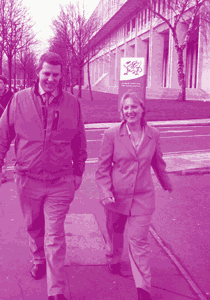
In July 2002 we published our Consultation Document on the draft Strategy and we received many detailed comments. The consultation and deliberations at the Walking and Cycling subgroup of the Welsh Transport Forum shared intense concern for this part of the Strategy. The key elements represent an approach which has the support of the majority of interested parties.
• Inclusive Mobility – the Welsh Assembly
Government and its partners demonstrate their commitment to equal opportunities
by adopting DfT publication 'Inclusive
Mobility' as good practice;
• Learning to Share Space – widespread recognition of the need for a realistic approach supported by research, guidance and training;
• Good Design - vital for promoting use of walking and cycling infrastructure;
• Speed Reduction – stemming from the Road Safety Strategy for Wales a proactive programme for introducing Quiet Lanes and Home Zones;
• Maintaining Quality – finding the best ways of funding and maintaining foot and cycle ways in urban and rural areas;
• Clearing Obstructions – making foot and cycle ways easier, simpler and safer to use;
• Cycle Parking – encouraging provision for visitors and employees at major public and private sector sites;
• Public Transport – working with transport operators on carriage of cycles on trains and coaches; continuing the programme of Safe Routes to Stations;
• Crime Prevention – tackling issues of personal security and cycle theft. Making foot and cycle paths safer and more attractive to use;
• National Cycle Network and National Trails – working with partners in public and voluntary sectors to develop and promote these Networks and Trails.
The Action Points are:
• Have regard to use of, and adherence to, the Department for Transport
Mobility document as good practice;
• Take note of research by DfT into understanding and avoiding conflict in shared space and issue additional guidance in Wales, as necessary;
• Develop a User Code of Conduct for Shared Routes in conjunction with walking, cycling and equestrian organisations;
• Commence work to gather Welsh Assembly Government Approved Design Guidance for both Urban and Rural application in Wales;
• Set up a Walking and Cycling website which will allow on-line access to design guidance, best practice and other information to assist practitioners;
• Adopt the principles of Non-Motorised User Audit for all new road schemes in Wales;
• Work in partnership with others to develop Quiet Lanes pilot projects and promote the wider implementation of Quiet Lanes;
• Develop and follow a programme for street audits in major towns and cities;
• Require cycle parking provision for both visitors and employees at major public and private sector employers without creating visual intrusion;
• Discuss with Public Transport operators ways of providing for cycles on trains, buses and long-distance coaches;
• Improve the provision and quality of existing parking facilities for cycles;
• Continue rolling programme of Safe Routes to Stations.